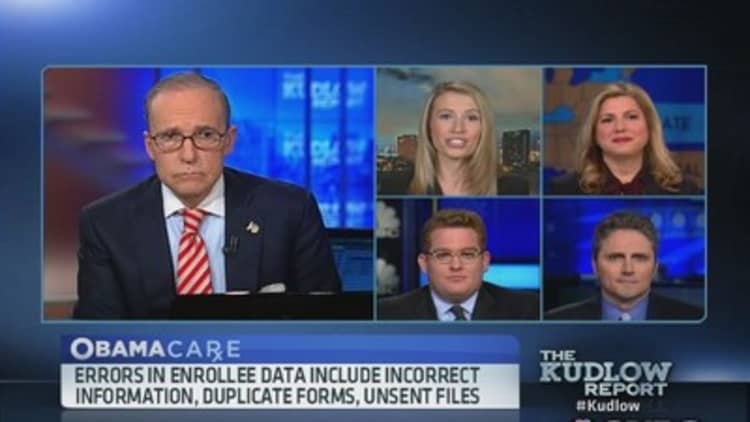Believe it or not, Obamacare may have a silver lining.
Health-care reform in the U.S will push the health-care industry to adopt technologies that will keep costs down, improve treatment and even save lives, said Eric Dishman, an Intel fellow and general manager of the company's health and life sciences group.
(Read more: These are the guys actually making money off Obamacare)
"Technology is not a magic pill, but no doubt we are going to have to use technology to save money and improve care for all Americans," Dishman said.
Most people worldwide are pretty optimistic about how technology will improve health care and are willing to embrace new ways of tracking and treating their health conditions, according to a survey conducted by Penn Schoen Berland published on Monday.
According to the study—which surveyed 12,000 people worldwide and was commissioned by Intel—most people are OK with virtual visits to doctors and using sensors to track their health.
(Read more: Obamacare 'perfect storm': Feds reveal 10 percent error rate)
For example, more than 70 percent of respondents are receptive to using toilet sensors, prescription bottle sensors or swallowed health monitors in their health-care treatment.
"These simple sensors, which are cheap, cheap, cheap can be game changing," Dishman said.
The fact of the matter is, consumer technology is altering the way people think about health care.
"There is a real sea change happening. The consumer readiness to use technology themselves at home and take a proactive role in their health is ahead of where the health-care systems are delivering those models," Dishman said.
People see the advances technology has made in other aspects of their lives and wonder why the same advancements have not been integrated in the health-care system.
The rise of mobile has a lot to do with this, Dishman said.
"In the last few years we have seen an explosion of smartphones. And there's starting to be these apps people can use to track different things about their health, at least for fitness and it's starting to head that way for health care," he said. "Consumers' expectations are leaping ahead of the governments and businesses. The health-care industry is the last one to truly go digital."
For example, you may use your smartphone to do an ultrasound on yourself, Dishman said.
"That's where the world is going and where consumer expectation is. If you have a smart device that can tell you to 'move a little bit to the left or to the right' and that has the kind of technology and algorithms to process that data, then you can do the ultrasound yourself."
Dishman himself performed an ultrasound on himself during a TED Talk earlier this year with a portable ultrasound device built by Mobisante. The device can plug into a smartphone or a tablet and enable people to perform their own ultrasound.
According to the survey, about 30 percent of people said they would trust themselves to do their own ultrasound. And 53 percent of people said they would trust a test they administered as much or more so than if their doctor performed the test.
Peoples' shift in attitude about technology and health care will ultimately mean fewer hospitals are needed, Dishman said.
"We've become hospital addicts in a way," he said. "Sixty to 70 percent of what is done at hospitals could be done at home, sometimes with virtual visits, sometimes with a nurse, but it can be done at home," Dishman said.
According to the survey, 72 percent of people said they were open to communication technologies that allowed them to remotely connect with their doctor and half said they would trust a diagnosis that was shared in a video conference with their physician.

People are also pretty open to sharing their personal health information if it means that their treatment will be cheaper. More than 80 percent of respondents said that they would anonymously share their information to cut costs and improve treatment.
Collecting and sharing more data will continue to be a game changer in the health-care industry because it means improved preventive care and quicker, more accurate diagnosis and treatment, Dishman said.
"At the end of the day doctors do their best to treat you with the impoverished data about you. It's almost criminal that we ... make life and death decisions about you on such little data," he said.
But in the future, the combination of real-time data that could be collected from a person's smartphone and from wearable devices, along with the genomic data that can be harnessed and the information that can be shared between physicians on networks will dramatically improve care, he said.
"The biggest thing from this shift is really a combination of the things. It's the data that is collected and shared with these technologies," Dishman said. "That shift to data driven health care is going to change us. It's going to save lives and money in health care."
—By CNBC's Cadie Thompson. Follow her on Twitter @CadieThompson.


